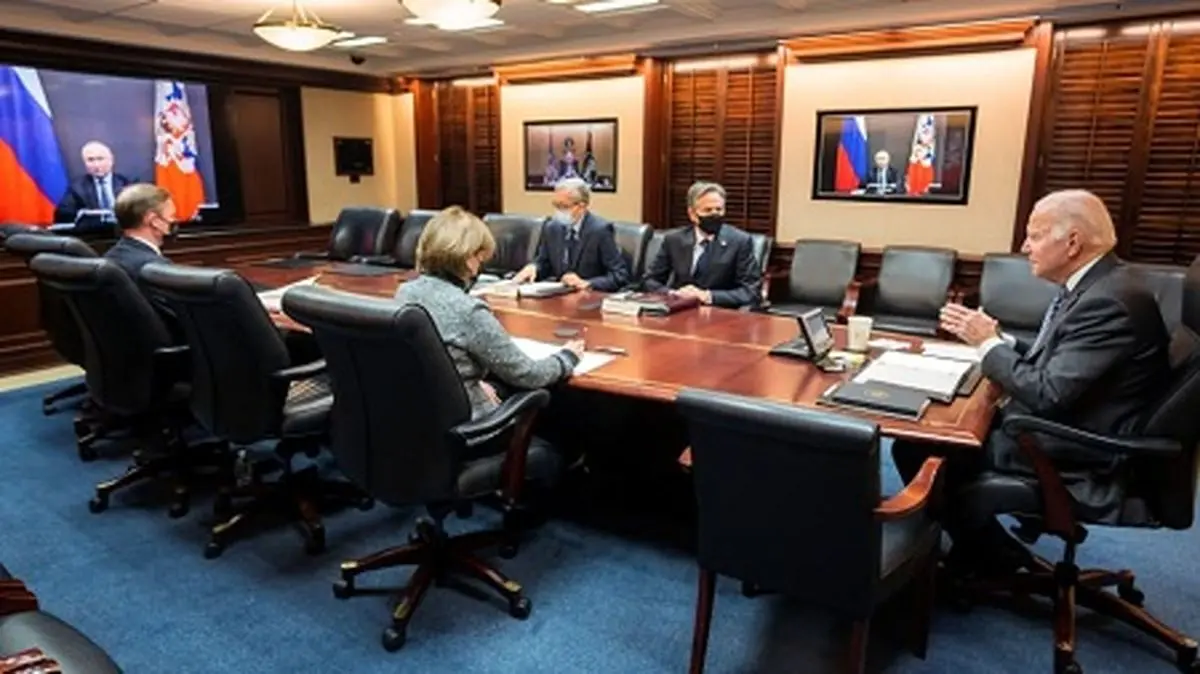Kremlin: US, Russia leaders agree to further talks on Ukraine

Presidents Vladimir Putin and Joe Biden set out their opposing positions on Ukraine in a video call on Tuesday and agreed that Russia and the United States should keep talking, the Kremlin said.
"It's hard to expect any sudden breakthroughs, but the presidents demonstrated their willingness to continue practical work and begin discussing sensitive issues that seriously concern Moscow," Kremlin aide Yuri Ushakov said after the two-hour talks.
Beyond the agreement to hold further discussions, there was no sign of any narrowing of positions in Moscow's readout of the conversation, which followed weeks of tension over the massing of Russian troops on the border with Ukraine.
A Kremlin statement said Putin repeated Moscow's accusation that Ukraine was behaving provocatively and taking a "destructive line" aimed at dismantling agreements from 2014 and 2015 designed to end a war with Russian-backed separatists.
It said Biden spelt out the possibility of Western sanctions against Russia if the situation escalated and accused Moscow of threatening behavior. Putin responded that "it is actually NATO that is making dangerous attempts to conquer Ukrainian territory and is building up its military potential at our borders."
"Therefore, Russia is seriously interested in obtaining reliable, legally fixed guarantees that rule out NATO expansion eastward and the deployment of offensive strike weapons systems in states adjacent to Russia," the Kremlin said.
It said the two leaders agreed to instruct their representatives to engage in "substantive consultations on these sensitive issues".
Russian authorities have said that NATO's growing ties with Ukraine and the possibility of the alliance deploying missiles targeted against Russia there represent a "red line" it will not allow to be crossed.
Putin also told his US counterpart he wanted guarantees that offensive strike systems would not be deployed in countries close to Russia, the Kremlin said.
The talks were held as the West voiced concerns that Russia will invade Ukraine and warned of "strong economic and other measures" as punishment should Moscow start a military conflict.
The Kremlin, which said before Tuesday's meeting that it did not expect any breakthroughs, has denied harboring any intention to attack Ukraine and said that its troop posture is defensive.
"Two hours suggests to me they had a substantive conversation. But they're a long way from agreeing anything. But since these aren't easy issues, it's not a bad sign – as long as everyone keeps talking," said Olga Oliker, program director for Europe and Central Asia at International Crisis Group.
The Kremlin said bilateral ties with Washington were in an "unsatisfactory state". It said Putin proposed removing limits on the functioning of their respective embassies following a tit-for-tat row in which each country has reduced the number of diplomats that the other can post.
Putin and Biden underlined the need to strive to normalize relations and continue cooperating on issues of mutual interest such as cyber security, Ushakov said.
He said they had not discussed a proposal to meet in person on neutral territory despite having previously mooted the idea.
WESTERN ALLIES ENGAGED
Leaders from Britain, the US, France, Germany and Italy spoke on Monday and "agreed to stay in close touch on a coordinated and comprehensive approach in response to Russia’s military build-up on Ukraine’s borders", the White House said.
The Russian rouble weakened slightly on Tuesday, with some market analysts predicting the talks would de-escalate tensions and others saying the US sanctions threat eroded hopes of finding common ground.
US officials have told members of Congress they have an understanding with Germany about shutting down the Nord Stream 2 pipeline if Russia invades Ukraine, a senior congressional aide said.
"If President Putin moves on Ukraine, our expectation is that the pipeline will be suspended," Undersecretary of State for Political Affairs Victoria Nuland told the Senate Foreign Relations Committee.
The US has evaluated the possibility of curbing investors’ ability to buy Russian debt on the secondary market, a measure that even if taken only by Washington was seen as having a severe impact on Russia’s government, according to a person with direct knowledge of the matter.
CNN reported that sanctions could include disconnecting Russia from the SWIFT international payment system used by banks around the world, an extreme step that would likely require coordination with allies.
German Gref, chief executive of Russia's top bank, Sberbank, on Tuesday called that idea "nonsense" and "impossible to execute".
The US has urged both Ukraine and Russia to return to a set of largely unimplemented agreements signed in 2014 and 2015 that were designed to end the conflict in eastern Ukraine.
END
